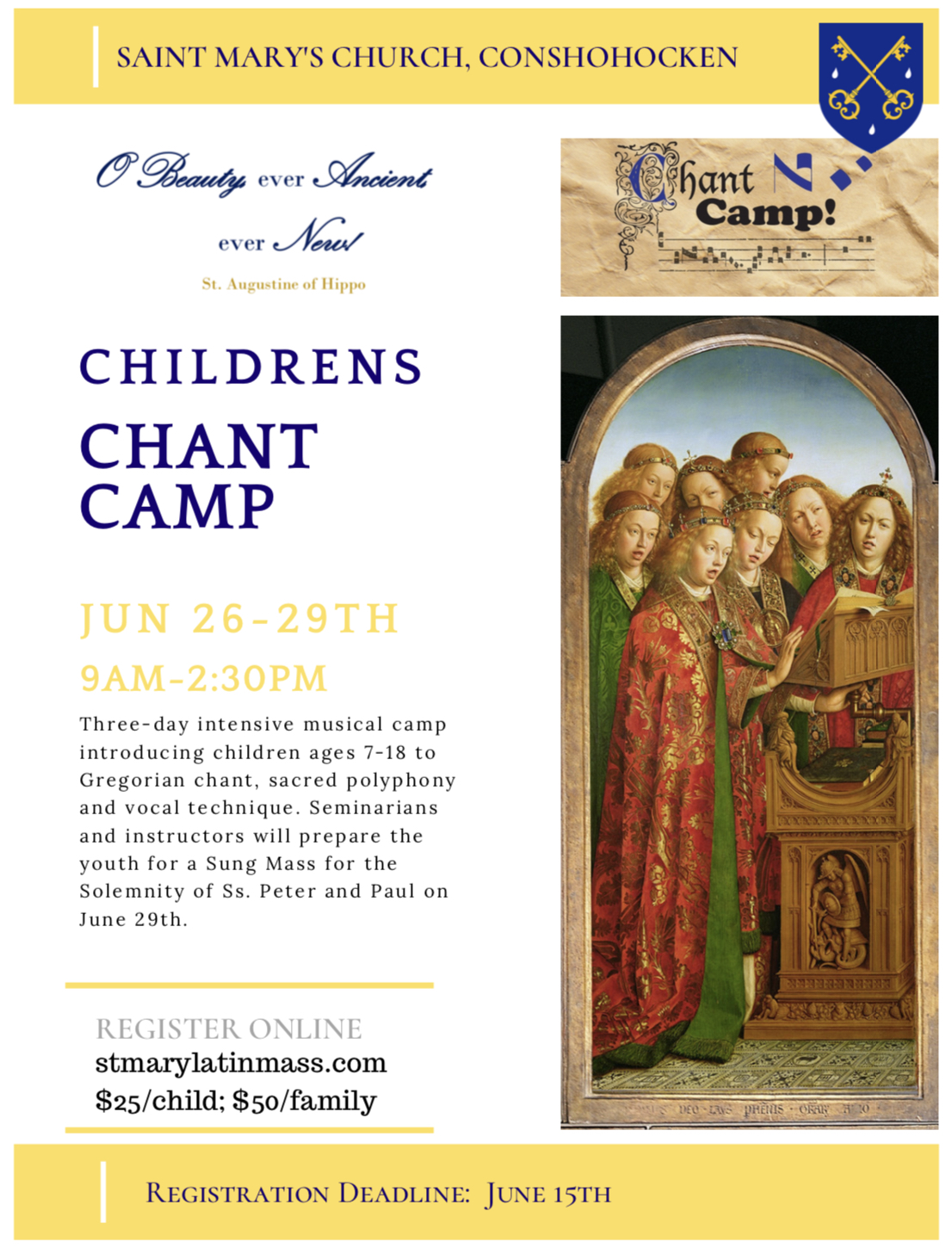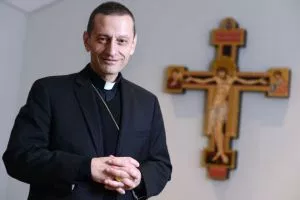Saint Mary’s in Conshohocken, PA will host a chant camp, June 26-29 for ages 7-18. High school youth are highly encouraged to attend. Visit the parish website for Registration and more information.


Catholic musicians gathered to blog about liturgy and life
Saint Mary’s in Conshohocken, PA will host a chant camp, June 26-29 for ages 7-18. High school youth are highly encouraged to attend. Visit the parish website for Registration and more information.

Pope St. John Paul II in 1979:
A letter to the synod bishops by Italian blogger Sara Manzardo, a young married woman, has drawn quite a bit of interest over there. She writes:
[According to the newspapers] this synod on youth will be talking mostly about migrants, LGBT, and naturally about premarital sex, because chastity seems to be the main reason why youth drift away from the Church.
But we young people deserve much more. We aren’t satisfied any more to hear homilies full of politics, the common good, the news, the environment. […]
We drift away because we don’t find anything in the Church different from what they say to us outside: nothing more moving, nothing worth the trouble of living and dying.
Instead we come closer to the Church when someone explains to us why they have chosen chastity […]. We come closer when someone opens our eyes about our life, when someone says words to us that burn like salt in a wound, but they’re living, true, strong words.
This week at the Synod on youth,  Bishop Frank Caggiano of Bridgeport urged participants to look to the way of beauty as the transcendent value particularly needed in efforts at evangelization:
Bishop Frank Caggiano of Bridgeport urged participants to look to the way of beauty as the transcendent value particularly needed in efforts at evangelization:
It was Saint Thomas Aquinas who taught that the human person can encounter God by three privileged paths: truth, beauty and goodness. In terms of technology’s formative influence on young people, I would respectfully suggest that it is the path of beauty that must be better explored for the sake of evangelization and catechesis.
In my experience with young people, the questions that haunt them are not simply intellectual ones. They are first and foremost affective questions (i.e., “questions of the heart”), that ask about their self-worth, the reasonableness of hope, the ability to commit to another and to be loved in return. We must unlock the power of beauty, which touches and captures the heart, precisely by utilizing the many opportunities now afforded by digital communication and social media to accompany young people to experience beauty in service of the Gospel.
Let us offer the sacred liturgy as a celebration of the beautiful, the transcendent, with an engagement of the affective senses. Let us work to capture the heart of all believers to encounter a God who does not promise a sterile existence but a life that is itself beautiful, rich in meaning, that invites one’s heart to dare to believe that this earthly life is worth living and worth fighting for in light of an eternal life where the restlessness of the heart will find its final rest in the salvation that alone comes from Christ Jesus the Lord.
At the Synod on Youth, Archbishop Anthony Fisher, O.P., of Sydney has made a quite unconventional apology to Catholic youth: not only for wrongful acts committed, but also for failures to hand on the faith in its fullness, including “unbeautiful liturgies” and poor preaching.
The Catholic Herald writes:
In addition to apologising for the Church’s failures with clerical sexual abuse, the archbishop also apologised for the ways in which the Church had failed to “introduce you to the person of Jesus Christ, his saving word and his plan for your life.”
“And for the times when you were searching for your sexual, ethnic or spiritual identity and needed a moral compass, but found Church people unsympathetic or ambiguous: I apologise,” he said.
The Catholic Church, Archbishop Fisher said, often “sold you short” by not challenging young people to live up to their baptismal call to holiness, by offering them “unbeautiful or unwelcoming liturgies” and by not sharing with them Church traditions such as the sacrament of reconciliation, pilgrimages and Eucharistic adoration.
He apologised for “poor preaching, catechesis or spiritual direction” that failed to inspire conversion and for families, dioceses and religious orders that adopted a “contraceptive mentality” that did not even try to give birth to new vocations.
In addition to his apology, the Sydney archbishop pleaded with young people: “Never give up on Jesus because of our failures. Never give up on the Church that you can help make more faithful. Never give up on the world that, with Christ and the Church’s help, you can make a better place.”
Photo credit: screenshot from Twitter.
A column by Hilary Cesare at Ignitum Today about what so many Catholic are missing in their worship, (hint, it begins with “prop” and ends with “ers,”) and some suggestions about how they might get started.
Have You Been Missing Out on a Centuries-Old Catholic Musical Tradition?
Some of the most divisive conversations amongst Catholics today arise over music at Mass. Most arguments revolve around the style of music or the instrumentation. However, these arguments generally don’t focus much on the texts of the music. The majority of us have grown up in parishes that are unaware of or lacking an essential part of Church’s musical heritage: The Propers. We should stop asking “Is the music religious?” but rather, “Is the music (and its text) liturgical?” The Church assigns specific chants/texts to each day of the liturgical year, just as she assigns certain readings & psalms to each day of the year. The General Instruction of the Roman Missal says that these scriptural, liturgical texts (called “the Propers”) are the ideal and most desirable thing to be sung at Mass.
We are accustomed to the readings, responsorial psalm, and Alleluia verse changing each week in the Missalette. The scriptural texts of the Mass Propers also change daily and allow us to more fully participate in the liturgical day being celebrated. There are three times when the Propers are sung at a Novus Ordo Mass
(A little quibble, the Gradual can be sung, of course.)
(Oh, and I don’t know Hilary but I’ve chosen, among other labels, “youth” because… well, to me everyone is.)
A new school year is just around the corner, and the bright young children will soon be sitting in their uniforms in our Catholic schools.
Now is the time to give them access to their hereditary music as Catholics: Gregorian chant.
Mary Ann Carr Wilson has surely taught two hundred young chanters this summer in her hugely successful summer Chant Camps, and although not everyone can travel to California for this experience, everyone can do something.
Meanwhile, in classrooms, teach the children how to sing and how to read Gregorian chant. It will be good for them in every way, from posture to general liberal arts learning to contemplation.
It’s always easy to think that kids will like the easiest music. But the single-voiced unharmonized music of chant, besides being perfectly age-appropriate, is genius composition, and will foster a love of music that will last a lifetime.